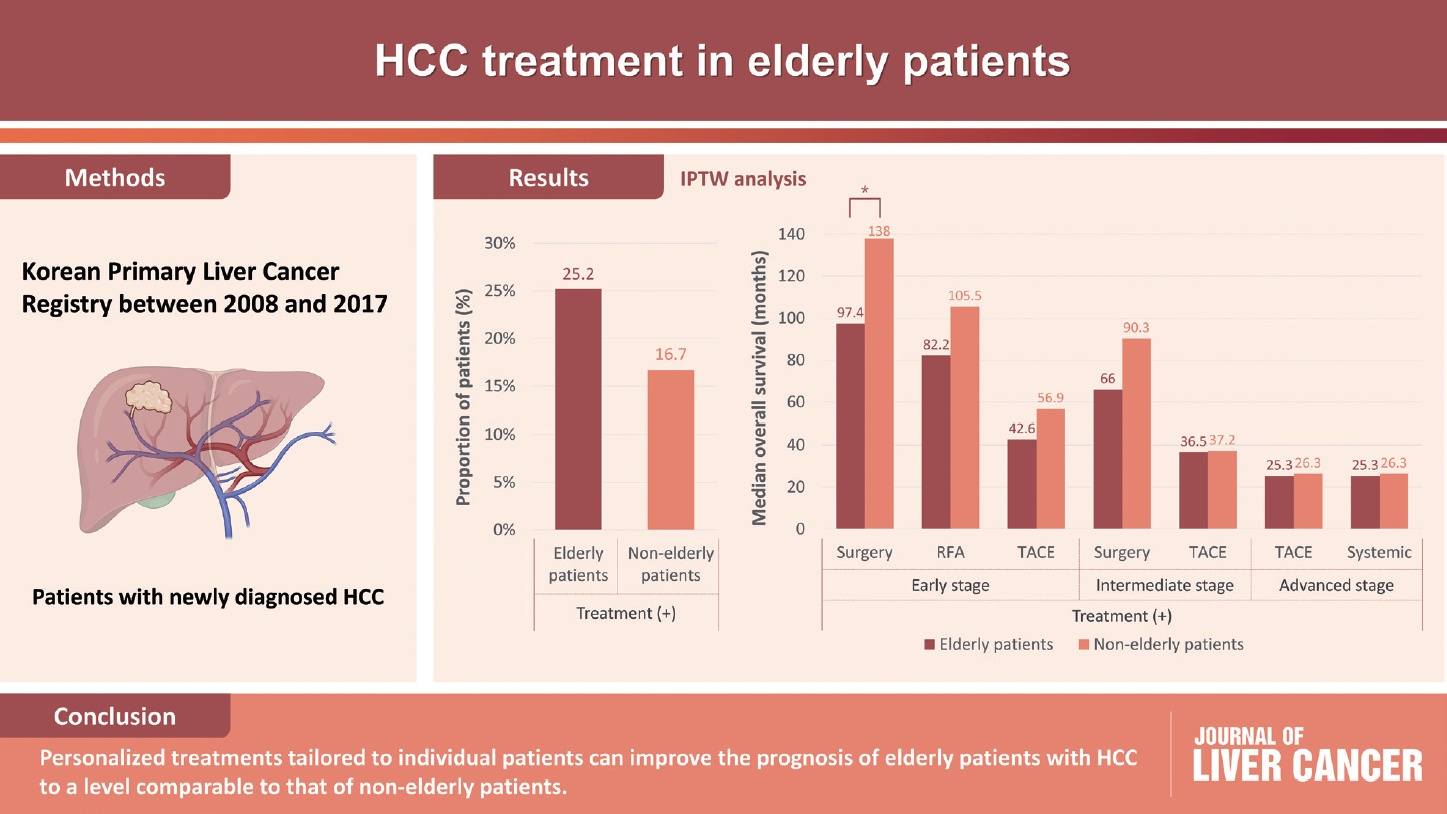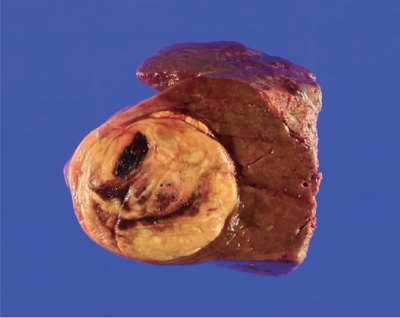Search
- Page Path
- HOME > Search
Original Article
- The efficacy of treatment for hepatocellular carcinoma in elderly patients
- Han Ah Lee, Sangheun Lee, Hae Lim Lee, Jeong Eun Song, Dong Hyeon Lee, Sojung Han, Ju Hyun Shim, Bo Hyun Kim, Jong Young Choi, Hyunchul Rhim, Do Young Kim
- J Liver Cancer. 2023;23(2):362-376. Published online September 14, 2023
- DOI: https://doi.org/10.17998/jlc.2023.08.03

- 1,734 Views
- 87 Downloads
- 2 Citations
-
 Abstract
Abstract
 PDF
PDF Supplementary Material
Supplementary Material - Background/Aim
Despite the increasing proportion of elderly patients with hepatocellular carcinoma (HCC) over time, treatment efficacy in this population is not well established.
Methods
Data collected from the Korean Primary Liver Cancer Registry, a representative cohort of patients newly diagnosed with HCC in Korea between 2008 and 2017, were analyzed. Overall survival (OS) according to tumor stage and treatment modality was compared between elderly and non-elderly patients with HCC.
Results
Among 15,186 study patients, 5,829 (38.4%) were elderly. A larger proportion of elderly patients did not receive any treatment for HCC than non-elderly patients (25.2% vs. 16.7%). However, OS was significantly better in elderly patients who received treatment compared to those who did not (median, 38.6 vs. 22.3 months; P<0.001). In early-stage HCC, surgery yielded significantly lower OS in elderly patients compared to non-elderly patients (median, 97.4 vs. 138.0 months; P<0.001), however, local ablation (median, 82.2 vs. 105.5 months) and transarterial therapy (median, 42.6 vs. 56.9 months) each provided comparable OS between the two groups after inverse probability of treatment weighting (IPTW) analysis (all P>0.05). After IPTW, in intermediate-stage HCC, surgery (median, 66.0 vs. 90.3 months) and transarterial therapy (median, 36.5 vs. 37.2 months), and in advanced-stage HCC, transarterial (median, 25.3 vs. 26.3 months) and systemic therapy (median, 25.3 vs. 26.3 months) yielded comparable OS between the elderly and non-elderly HCC patients (all P>0.05).
Conclusions
Personalized treatments tailored to individual patients can improve the prognosis of elderly patients with HCC to a level comparable to that of non-elderly patients. -
Citations
Citations to this article as recorded by- Efficacy and Safety of Surgical Resection in Elderly Patients with Hepatocellular Carcinoma: A Systematic Review and Meta-Analysis
Jin-Soo Lee, Dong Ah Park, Seungeun Ryoo, Jungeun Park, Gi Hong Choi, Jeong-Ju Yoo
Gut and Liver.2024; 18(4): 695. CrossRef - Achieving Sufficient Therapeutic Outcomes of Surgery in Elderly Hepatocellular Carcinoma Patients through Appropriate Selection
Han Ah Lee
Gut and Liver.2024; 18(4): 556. CrossRef
- Efficacy and Safety of Surgical Resection in Elderly Patients with Hepatocellular Carcinoma: A Systematic Review and Meta-Analysis

Case Reports
- Hepatocellular Carcinoma Arising from Hepatocellular Adenoma in an Elderly Male Patient
- Manuel Lim, Jong Man Kim, Ji Eun Kwon, Eun Sung Jeong, Jaehun Yang, Okjoo Lee, Kyeong Deok Kim, Sang Jin Kim, Jinsoo Rhu, Gyu-Seong Choi, Jae-Won Joh
- J Liver Cancer. 2021;21(1):87-91. Published online March 31, 2021
- DOI: https://doi.org/10.17998/jlc.21.1.87

- 4,671 Views
- 106 Downloads
- 1 Citation
-
 Abstract
Abstract
 PDF
PDF - Hepatocellular adenoma is a benign tumor of the liver occurring predominantly in young women taking oral contraceptives. The malignant transformation of hepatocellular adenoma into hepatocellular carcinoma has rarely been reported. Herein, we report the case of an elderly male patient with hepatocellular carcinoma that developed from hepatocellular adenoma. The patient’s high risk for surgery and conflicting biopsy and imaging results made it difficult to determine the treatment direction. Eventually, the mass was completely removed by laparoscopic left hemi-hepatectomy without complications.
-
Citations
Citations to this article as recorded by- Radiofrequency Ablation versus Surgical Resection in Elderly Hepatocellular Carcinoma: A Systematic Review and Meta-Analysis
Jeong-Ju Yoo, Sujin Koo, Gi Hong Choi, Min Woo Lee, Seungeun Ryoo, Jungeun Park, Dong Ah Park
Current Oncology.2024; 31(1): 324. CrossRef
- Radiofrequency Ablation versus Surgical Resection in Elderly Hepatocellular Carcinoma: A Systematic Review and Meta-Analysis

- The Natural Course of Hepatocellular Carcinoma in a Super-Elderly Patient
- Park, Yoo Min , Choi, In Zoo , Shim, Jae Jun , Kim, Byung Ho
- J Liver Cancer. 2018;18(2):146-150. Published online September 30, 2018
- DOI: https://doi.org/10.17998/jlc.18.2.146
- 1,803 Views
- 36 Downloads
-
 Abstract
Abstract
 PDF
PDF - As the mean life expectancy increases, the incidence of hepatocellular carcinoma (HCC) in superelderly patients (>85 years old) is expected to increase in Korea. However, their clinical features, treatments, and treatment outcomes are unclear. Herein, we present a case of a large single HCC and its natural course in an 86-year-old man who refused any treatment following histologic diagnosis.

Review Article
- Treatment and Surveillance of Hepatocellular Carcinoma in Elderly Patients
- Rho, Seoung Yoon , Lee, Hyun Woong , Kim, Kyung Sik
- J Liver Cancer. 2018;18(2):103-114. Published online September 30, 2018
- DOI: https://doi.org/10.17998/jlc.18.2.103
- 2,363 Views
- 74 Downloads
-
 Abstract
Abstract
 PDF
PDF - Hepatocellular carcinoma (HCC) is the third most common cancer in the digestive system based on survey of domestic cancer incidence, and the ratio of elderly aged 65 or older is expected to rise steadily, leading to a higher incidence of total hepatocellular carcinoma. The most important thing in treating these older patients with HCC is to assess the benefits and risks of the treatment in advance. In other words, the benefit of treatment should be greater than the reduction of survival period or maladjustment due to treatment. Based on these perspectives, we examined how the detailed treatment of hepatocellular carcinoma differs from that of general treatment in elderly patients. In conclusion, older age was not a definite prognostic factor of survival risk-benefit comparison in the most treatment modalities. However it should be carefully considered and approached about possible complications in treating HCC in elderly patients.


 E-submission
E-submission THE KOREAN LIVER CANCER ASSOCIATION
THE KOREAN LIVER CANCER ASSOCIATION

 First
First Prev
Prev



 Follow JLC on Twitter
Follow JLC on Twitter